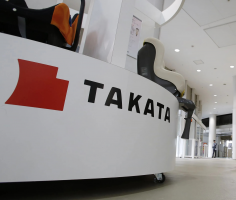
— The National Highway Traffic Safety Administration (NHTSA) has decided about 56 million Takata airbag inflators won't be recalled as planned, a decision which quickly got the attention of safety advocates.
About 19 automakers won't be forced to replace the Takata airbag inflators after an independent company studied the lifespan of airbag inflators equipped with chemical drying agents.
An independent aerospace company associated with Northrop Grumman tested the desiccated inflators to simulate 30 years of aging and allegedly found no problems. Investigators did find the heat and humidity of Florida may decrease the lifespan of the inflators and vehicles in that state will need to be monitored more closely.
Takata was supposed to recall up to 56 million airbag inflators by the end of 2019 unless the company could prove the airbags were safe. Unlike most of the deaths and injuries caused by Takata inflators, the newest inflators contain drying agents called dessicants.
Researchers determined dozens of people were killed and hundreds were injured because of a chemical called ammonium nitrate. The chemical is used to create what should be a small explosion to deploy the airbags.
But the ammonium nitrate, contained in metal airbag inflators, is volatile when the inflators age and moisture enters the inflators. Instead of protecting occupants in crash impacts, the Takata inflators violently explode even in the smallest fender-benders.
In addition to Takata, 10 automakers performed tests on the dessicated inflators and found no problems other than with certain Volkswagen Passats and Beetles equipped with inflators that could go bad in four years. Those vehicles will be recalled by the end of 2020.
NHTSA says all other inflators "do not pose risk to safety in the coming years," but the agency will monitor the components for evidence of degradation.
Auto safety organization Center for Auto Safety (CAS) says federal safety regulators "waited until the middle of a global pandemic to take the most hands-off of next steps."
"[T]he National Highway Traffic Safety Administration (NHTSA) has reinforced its total lack of interest in most basic parts of their mission: overseeing recalls, undertaking independent research not requested by industry, and sharing vital safety information with the public." - Center for Auto Safety
According to the Center, NHTSA has bailed out of its authority to compel automakers to replace more than 50 million Takata airbag inflators. CAS says certain automakers still haven't repaired 50% of their vehicles equipped with dangerous Takata inflators.
And what NHTSA is doing is the opposite of transparency by holding back reports and data that should be available to the public.
The Center says it hopes NHTSA is relying on accurate scientific studies about the inflators, and while the government allegedly monitors the Takata situation, CAS says it will be monitoring the government.
NHTSA's decision doesn't include a separate matter concerning General Motors vehicles equipped with Takata airbags as the automaker has fought a recall of about 6 million trucks and SUVs which will cost GM more than $1 billion.
General Motors filed four petitions in four years trying to convince federal regulators a recall is unnecessary because the airbag inflators are allegedly safe.
But NHTSA has done nothing but prolong its final decision whether the vehicles are truly safe, something that sent owners into court alleging in a class action that GM is playing with people's lives.




